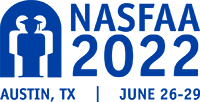NASFAA Inside the Beltway: Top 10 Issues Impacting Financial Aid Administration
By Hugh T. Ferguson, NASFAA Senior Staff Reporter
In rounding out NASFAA's 2022 National Conference, leadership provided members with key insight into issues that the profession will need to be on the lookout for in the next calendar year.
The final session of the conference provided a detailed focus on what's happening across the higher education industry, on campus, and in federal and state legislative houses across the country, as well as how those ongoing developments will impact the financial aid profession.
NASFAA President Justin Draeger was joined by Vice President of Public Policy & Federal Relations Karen McCarthy to examine the 10 most impactful challenges, trends, and opportunities facing the financial aid profession.
Some of the biggest issues concern conversations surrounding debt forgiveness, changes in public opinion on the government's role in higher education, federal methodology with big changes coming to FAFSA, declining enrollment trends, the regulatory process of negotiated rulemaking, the scope of the Department of Education's (ED) Student Aid Enforcement Unit, increasing state activism in higher education, and perceptions in the value of a college degree.
Draeger and McCarthy also provided a recap of the rate of change the profession has experienced in 2021 and detailed the varying NASFAA resources available to members in order to keep up with the changes.
Draeger detailed NASFAA's recent report offering thoughtful, systemic, and targeted policy solutions to address underlying flaws in the student loan repayment and servicing systems that lead borrowers into financial hardship, and also guided members through public opinion polls on what policies ED should be prioritizing.
McCarthy also walked members through NASFAA's efforts to develop varying flowcharts and tools to help chart out changes to FAFSA simplification and also gave members a reminder of NASFAA's State Advocacy Toolkit to provide resources and materials to support state-level advocacy concerning student aid policy.
As a part of the conversation, members also heard remarks from Vanderbilt University's Director of Student Financial Aid and Scholarships Brent Tener, who reflected on his term as the 2021-22 NASFAA national chair and extended thanks to the individuals involved in NASFAA who have worked tirelessly to make the profession better.
"Financial aid folks are the best folks anywhere," Tener said.
Tener also used his remarks to praise NASFAA's role in the financial aid community and how the organization has honorably represented the profession.
Over the past 12 years, Tener said that the organization has become an integral part of the policymaking process and that "NASFAA is the voice of financial aid."
"Thank you for a wonderful year, thank you for entrusting me to serve in this role to be a voice of NASFAA," Tener said. "It has been a cherished memory that I will never forget."
Remarks were also given by NASFAA's 2022-23 National Chair Brad Barnett, FAAC®, the associate vice president for access and enrollment management/director of financial aid and scholarships at James Madison University. Barnett pledged that NASFAA will be there to support the community through the varying challenges they will face in the year to come.
Barnett also gave thanks to Tener's leadership from the past year and remarked how integral he's been as a colleague.
"Brent puts the life in you, and I am a better person today because of the time that I have spent with Brent," Barnett said. "He's someone I admire, someone I have been happy to call a friend ever since I first met him so many years ago."
It's never too early to start looking ahead to education, networking, and unique events. We hope to see you all at the 2023 NASFAA National Conference June 29-July 2, 2023 in San Diego, California.
Publication Date: 6/29/2022

You must be logged in to comment on this page.